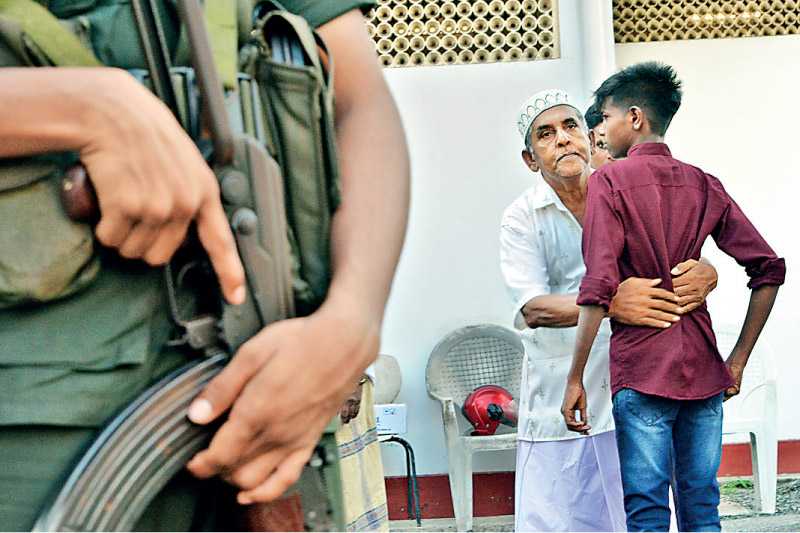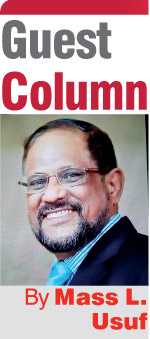Wednesday Feb 18, 2026
Wednesday Feb 18, 2026
Monday, 15 March 2021 01:20 - - {{hitsCtrl.values.hits}}

It is obvious from a reading of the report that the typical stereotyping of Muslims and Islam has been equated to national security issues. Most of the findings have nothing to do with national security – Pic by Shehan Gunasekara
 Technology is very helpful in many ways. One of which is when looking for something using a computer. In relation to the Sectoral Oversight Committee report on National Security dated 19 February 2020, I was keen to see the occurrence of certain words. The results were:
Technology is very helpful in many ways. One of which is when looking for something using a computer. In relation to the Sectoral Oversight Committee report on National Security dated 19 February 2020, I was keen to see the occurrence of certain words. The results were:
Terrorism mentioned 29 times; extremism 12 times; religions 24 times; Wakf (charity fund) 45; Madrasa 25 times; national security 66 times.
For ease of understanding, the relevant documents referred to herein are:
1. Eighth Parliament – Oversight Plan of The Sectoral Oversight Committees dated 24 January 2017.
2. Standing Orders of the Parliament.
3. Report of Sectoral Oversight Committee on National Security dated 19 February 2020.
Background to the Committee
1. Sectoral Oversight Committees of Parliament are appointed by virtue of Parliament Standing Order (SO) 111 as may be determined by the Committee of Selection.
2. Standing Order 111 (3) states, “The Committee of Selection shall determine the subjects and functions to be allocated to each Sectoral Oversight Committee.”
3. Each Sectoral Committee is given an area over which it has jurisdiction. Accordingly, as per Standing Order (7) (1) a Committee has to function within its jurisdiction. It states, “In order to determine whether any law, project or program relating to subjects within the jurisdiction of a Sectoral Oversight Committee are being implemented effectively …”
4. Pursuant to a resolution passed in Parliament on 19th December 2015, the Agenda for the Oversight Plan of the Sectoral Oversight Committees was constituted.
5. Sixteen Sectoral Oversight Committees were established and on 24 January 2017 the Oversight Plan for each of these were detailed.
6. The Plan for the Sectoral Oversight Committee on National Security (SOCNS) is seen in Item (3) of the above Agenda. The Plan also indicates the names of ministries and other institutions coming under the purview of the National Security committee.
From the above, the following becomes clear and evident.
1. The SOCNS has being given an identified plan of work.
2. The SOCNS has been informed of the ministries, departments and other institutions which come under its purview.
3. The SOCNS has been assigned a certain jurisdiction within which it has to function.
Departure from the norm
1. The title of the SOCNS as per the Parliament resolution is, ‘The Sectoral Oversight Committee on National Security’. The Report of this Committee should have had this title on the face of the report.
However, what is seen is the following: ‘Report of the Proposals for Formulation and Implementation of Relevant Laws Required to Ensure National Security that will Eliminate New Terrorism and Extremism by Strengthening Friendship Among Races and Religions’ dated 19 February 2020.
Can this be an administrative error?
2. This departure from the norm is the reason for the multiple occurrences of the above words. In the Parliament sanctioned Plan for the SOCNS, it is seen that (a) the word, ‘Religious’ is mentioned only once and that is in relation to Hindu Religious Affairs. (b) The word, ‘Terrorism’ is referred to in the Plan only once and that is with regard to the Prevention of Terrorism Act. (c) The word, “Extremism’ is not mentioned anywhere in the Plan of action. (d) The word, ‘Wakf’ is not mentioned anywhere in the Plan. (e) Madrasa is not mentioned anywhere in the Plan.
Strangely, these words ‘Terrorism’, ‘Extremism’, ‘Religious’, ‘Wakf’, ‘Madrasa’ occur 29, 12, 24, 45 and 25 times respectively in the SOCNS report.
Has the SOCNS violated its mandate and transgressed its scope?
3. The SOCNS report touches on Education at page 10 of the report. It extensively refers to Madrasa education etc. This is not part of the mandate given by Parliament to this Committee. In fact, there is a separate Committee for education that had been appointed named ‘Oversight Plan of the Sectoral Oversight Committee on Education & Human Resources Development’.
Has SOCNS exceeded its powers and gone beyond its jurisdiction?
4. The action plan passed by the Parliament specifically identifies the ministries and other institutions coming under the purview of the SOCNS. Under this SOCNS can act with regard to legislations governing the functions of the specified ministries, departments and institutions. This may be done only if it has relevance to the subject and importantly within the jurisdiction of the Committee.
The SOCNS however, seems to have digressed from this authority. It has delved into Ministries or Departments which are neither relevant to its scope of work nor within its jurisdiction. In the list of Ministries and Departments, no mention has been made about Department of Muslim Religious Affairs. The SOCNS however, refers to this Department in relation to Wakf matters.
The question is, whether it is ultra vires its powers and violated jurisdiction?
5. The Parliament resolution lays down the scope of work of the SOCNS. Under the sub-heading, ‘General Actions’, at page 23, it states as follows: “The Committee will work with the subjects under its jurisdiction to obtain a full understanding of the respective subject areas and ascertain what are the goals and objectives of each institution.”
The SOCNS Report however, has moved away from this legal requirement. It addresses issues outside the subject areas like (a) the Muslim Marriage and Divorce Law (MMDA) which is the personal law of the Muslims. (b) The Department of Muslim Religious Affairs in relation to Wakf Act which is not even mentioned under this Committee. (c) Halal certification process which has no relevance. (d) Banning face coverings which has no relevance to its scope. (e) Suspension of registration of political parties on ethnic and religious basis.
By touching on matters irrelevant to the Plan has the SOCNS Report surpassed its jurisdiction?
6. The word, ‘Media’ has been used in its various connotations at least 137 times. At page 31, the Report states that, “ … it is essential to prevent prejudice against an individual, group of individuals or a community in reporting information and news in electronic, print or social media for defence and ensuring the safety of citizens.”
No names of the media institutions which are popularly labelled bias and racists have been named. In contrast, the word, ‘Jamath’ has been used in its various senses at least 10 times and they have been specifically named.
Can this be a human error?
7. With regard to international schools the Committee notes, “…. is the functioning of a group of schools that have been registered as international schools to which non-Islamic students are not admitted under any circumstance.”
I am thinking if it had considered the following facts. (a) not all Muslim children get admission to government schools (b) all non-Muslim children on the other hand, are admitted to any government school (c) therefore, the need for a non-Muslim student to enter an international school does not arise (d) the emergence of international schools was as a result of the need to provide an educational platform to the Muslim students who have been left out of the mainstream.
It is the government’s responsibility to facilitate education. If it fails, then is it wrong if alternative schools are established?
8. Arguably several areas referred to in the report infringes on fundamental rights and several other international conventions. For example,
(a) International Covenant on Civil and Political Rights, Article 27 states:
“In those States in which ethnic, religious or linguistic minorities exist, persons belonging to such minorities shall not be denied the right, in community with the other members of their group, to enjoy their own culture, to profess and practice their own religion, or to use their own language.”
(b) Declaration on the Rights of Persons Belonging to National or Ethnic, Religious and Linguistic Minorities – 1982, Article 1:
“States shall protect the existence and the national or ethnic, cultural, religious and linguistic identity of minorities within their respective territories and shall encourage conditions for the promotion of that identity.”
(c) Declaration on the Elimination of All Forms of Intolerance and of Discrimination Based on Religion or Belief - 1981, Article 2:
“1. No one shall be subject to discrimination by any State, institution, group of persons, or person on the grounds of religion or belief.”
“2. For the purposes of the present Declaration, the expression “intolerance and discrimination based on religion or belief” means any distinction, exclusion, restriction or preference based on religion or belief and having as its purpose or as its effect nullification or impairment of the recognition, enjoyment or exercise of human rights and fundamental freedoms on an equal basis.”
These are besides the fundamental rights entrenched in our own Constitution.
9. It has been said that Minorities falling under the Article 27 of the International Covenant on Civil, Cultural and Political rights, that is, individuals belonging to national, ethnic, religious or linguistic minorities possess characteristics that form part of their identity and differ from the characteristics possessed by the majority population of the state. Because of these particularities, minorities can be often considered to be directly or indirectly discriminated against and to stand in unequal position in relation to majority.
10.The words national security had been repeated at least 66 times in the report. I could not find a single paragraph where it has been stated what is meant by national security. Or, what is the definition of national security. Or, what does national security mean in the Sri Lankan context. Without this basic framework of what constitutes national security, I was wondering, how can any committee formulate recommendations in a scientifically methodical manner?
A flawed document
It is obvious from a reading of the report that the typical stereotyping of Muslims and Islam has been equated to national security issues. Most of the findings have nothing to do with national security. Take for example the issue of MMDA or the Halal certification. Therefore, in my view, the sectoral committee on national security is a flawed document.
In the real interest of national security, I believe that a new committee needs to be formed with a clear mandate defining national security and its relevance to Sri Lanka in the wake of changing geo-political and regional political dynamics, religious and ethnic extremism prevalent in Sri Lanka among the Sinhala, Tamils and Muslims. The need is to address issues of really and truly relevant to national security.
The requirement is a human rights-based approach to national security.
(The writer is an Attorney-at-Law and former Corporate and Legal Advisor. He can be reached via email [email protected])